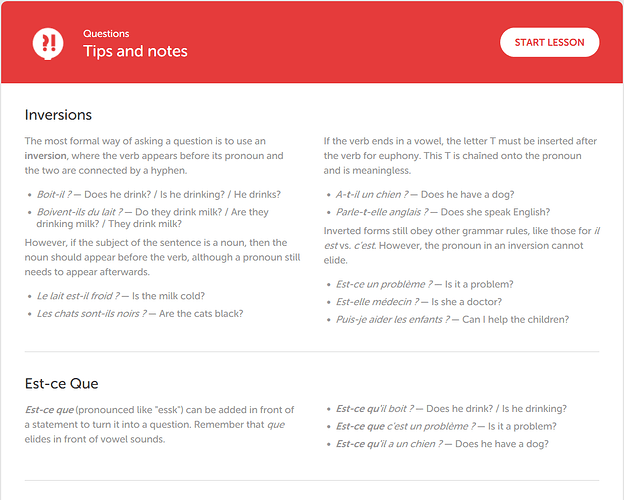Hello all! I’m new to LingQ and am very excited to be here, but I have a question. I’m most familiar with Duolingo, and they have this thing called the “notes” section. I’ll attach a picture for reference. These notes are for every lesson, and they give you vital points you need to know when learning a language. Such as the one I’ve attached, it tells you how to form questions. So, does LingQ have this type of system, and if not, how do I learn the language? Is it just something you’re supposed to pick up on? Because I feel like I’m not smart enough to catch on, and I would really like if there was a section that told me how to form questions, or form the past tense, or the future tense. Hopefully you understand my concern and question, and hope for some answers to help me out! Merci!
You ask for a language learning approach based on grammar. Lingq has an approach based on a massive input. That does not mean that you never will find grammar explained in Lingq, but the main thing is reading and listening. It is a more natural way of language learning. A child did not learn its mother tongue with grammar.
Read or listen to Steve Kaufman’s blog on this subject: Skipping the Basic Stages of Language Acquisition - The Linguist
If you have any doubts on the language you are learning, ask your question on the Forum (the Community) and mostly you will get an answer.
But then how do we learn the grammatical rules?! Am I supposed to just pick up on them eventually?
Most of them you’ll pick up on, according to LingQ’s/Steve’s philosophy. However, Steve also says that flipping through a grammar book occasionally won’t kill you, but ultimately “picking up on“ the grammar and structures of a language is more effective.
If you want, you can add “tags“ to a word that you’ve saved on LingQ in order to categorize them and review a certain type of word later (such as making a “dative case” tag to review the dative case). There is a feature now that automatically adds tags for a lot of words, maybe that could help you too.
Overall, don’t stress so much over the grammar and see what kind of results you get after just spending time with the language and having fun. I’ve personally seen great improvement in Russian in just a small period of time (9 months) of doing this, so at least for me personally this is extremely effective.
Is there a website that displays the grammatical rules of languages? I don’t know I’m a bit of a perfectionist and I’d like to know exact sources where I can get reliable information because this whole “you’ll pick up on it” thing is making me quite anxious. I feel like I won’t “pick up on it.”
The only site that probably has the grammatical structure of every single language would probably be wikipedia, but that will not teach you anything.
I understand where you’re coming from. I do not use LingQ as it was intended because I want to learn the grammar. I use other books to supplement the exposure I get here at LingQ…
My suggestion to you, is to purchase a grammar book, or find a site that covers the grammar of French. You can learn the rules from the grammar book, but you will see it all in action here at LingQ. To me, that is the beauty of this site.
Even though I have a little over 5000 words for Russian here on LingQ, I converse in the language every day without a problem and if I really came back to clear up all of my lingqs it would be much more (I studied Russian for 4 years while in university).
The other thing is you’ll need consistency. I am not consistent here on LingQ, but I try to look at my languages in some way every day. Sometimes life gets in the way, but in general I am able to visit each language every day.
Ok thank you for the advice! I think I’m going to purchase a grammar book. Just by looking on Amazon, it looks like there is a plethora of them.
Note that nothing prevents you from using Duolingo and LingQ in conjunction. Using the two methods together can allow you to use Duolingo to practice the basics and learn grammar, while you start building up an extensive vocabulary with he LingQ method.
Actually, a wast majority of “this method vs. that method” arguments I see out there are for methods you totally could and probably SHOULD be used together. LingQ vs. Assimil, Assimil vs. Duolingo, Duolingo vs. LingQ – there is actually no " vs. " in any of those pairings because the methods could totally go hand in hand, each having their own strengths that can build on each other.
Having said that, as others have pointed out, you’ll be surprised by how much grammar you actually learn simply through exposure through reading and listening on LingQ. It’s a bit counter intuitive at first, but the more you do it, the more you’ll see how it works.
